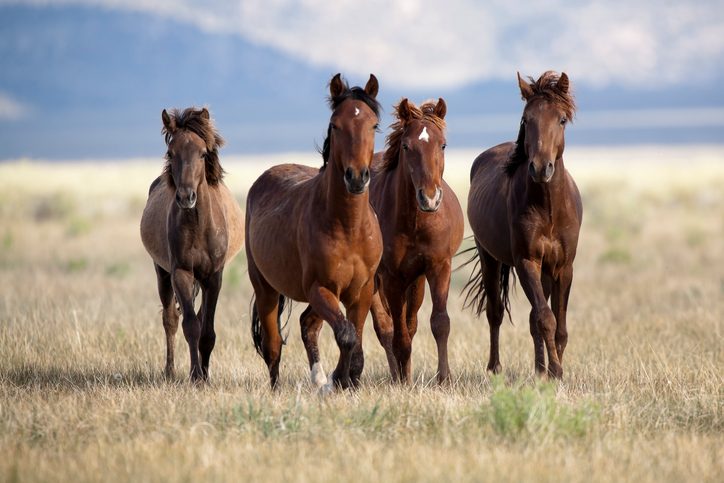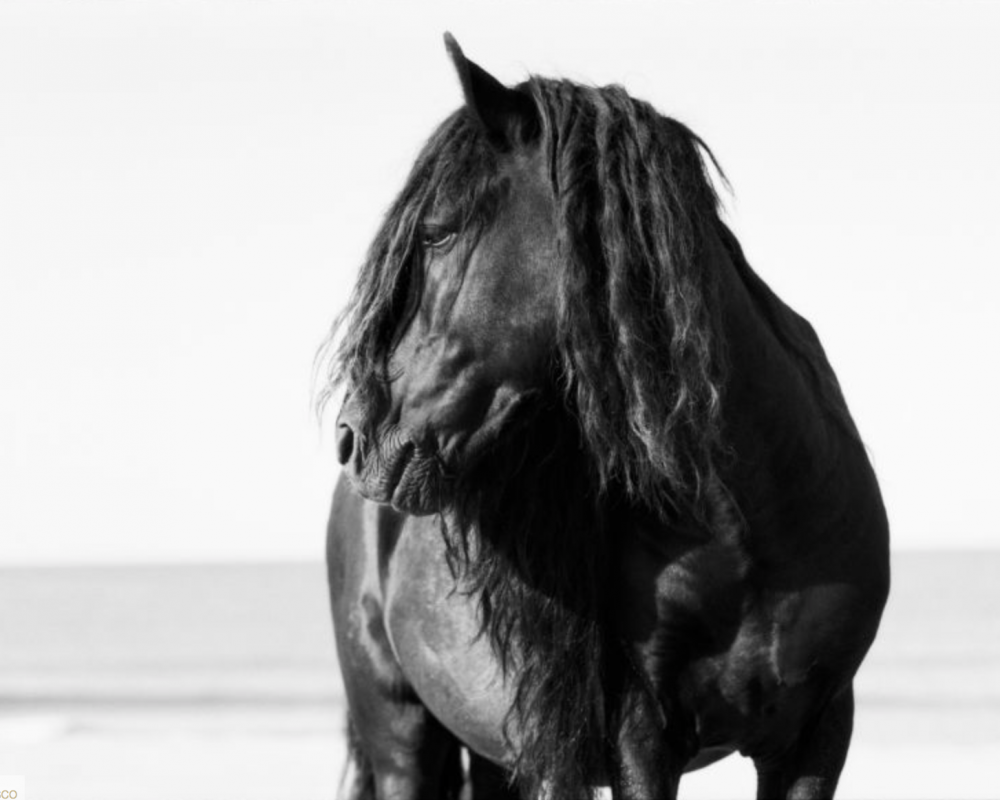The investigative agency Animals’ Angels (AA) has released a detailed report on their findings pertaining to horse slaughter, focusing on the U.S. to Canada pipeline. According to AA, in 2015 67,894 horses were slaughtered for human consumption in Canada and 44,000 of them originated in the United States.
The European Union banned imports of horsemeat from Mexico in 2015, citing concerns over veterinary medicines such as Phenylbutazone tainting meat and being potentially hazardous to humans. Now, the spotlight is on Canada. With such a large percentage of horsemeat originating in the U.S., the same concerns regarding Mexican slaughter plants apply to those in Canada.
As a way to temper these concerns, as of February 28, 2017 the EU will require all horses shipped from the US to Canada undergo a six month quarantine under the misguided assumption this will lower the risk of veterinary drugs contaminating horse meat. Not only will the drugs remain, but the welfare of these animals during quarantine is of grave concern to animal advocacy groups.
Animals’ Angels has spent countless hours investigating the U.S.- Canada slaughter pipeline. They’ve captured footage of rampant animal abuse at auctions popular with “killer buyers.” The atrocities were many and wide-ranging – from blind horses with broken legs to neglected horses on the brink of starvation. These animals were sold at auction for sometimes as little as $20, only to be shipped north in intolerable conditions where they are fattened up and slaughtered.
Investigators visited the following auctions on numerous occasions:
New Holland Sales Stables - New Holland, PA
Middleburg Livestock Auction, PA
Mel’s Stable - New Holland, PA
Sugarcreek Auction – OH
Shipshewana – IN
Kalona Auction - IA
Billings Horse Auction – MT
Horse with severe infection (left) at New Holland sale was later shot and thrown in dumpster (right). Photo courtesy of Animals’ Angels.
Below are brief descriptions of what investigators found on their visits:
- AA investigators regularly documented severe cases of animal abuse, neglect, and cruelty. Multiple horses were found in poor condition and with obvious wounds. A horse at the New Holland auction was deemed beyond saving and an auction employee shot it without consulting a veterinarian beforehand. Investigators later found the animals’ body in a dumpster.
- Also at New Holland, investigators witnessed a downer mare with her head tied as she was repeatedly kicked, abused, and jeered by auctions workers as she struggled, unable to rise. The mare and another horse were eventually taken outside and shot.
- Horses were kept in overcrowded pens, at times without access to food, water, and shelter. Often times the pens were knee deep with mud and manure.
- Aggressive horses would bite and kick at the others, stallions sometimes not separated.
- A few horses were seen with severe cases of the strangles virus, their cases so advanced puss was dripping from the undersides of their faces.
- Horses were often times prodded, hit in the face, and had gates slammed on them.
Killer buyers were present at each of the auctions, most seen leaving with fully loaded trailers; in some instances, the majority of horses were sold to kill-buyers. At the Sugarcreek auction, which is held weekly, investigators estimate that 95% of the horses go to slaughter.
Animals’ Angels conducted extensive investigations into the killer buyers who frequent the above auctions, both through observation and the collection of documentation collected via the Freedom of Information Act. The main buyers investigated were the following:
Bruce Rotz
Rotz is a Pennsylvania-based kill buyer who regularly ships horses to Viande Richelieu in Quebec. Rotz also owns his own trucking company, which he uses to ship horses over the border. There were two transport incidents involving Rotz’s trailers with a combined 40 horses killed in these events. There are numerous USDA Animal and Plant Health Inspection Service (APHIS) violations against Rotz, including improper documentation and the shipment of injured or blind horses to slaughter.
Investigators followed a transport truck leaving Rotz’s farm destined for the Richelieu plant. The horses were packed into the trailer for more than 24 hours and never given water.
Brian Moore
Also from Pennsylvania, Brian Moore has two APHIS violations against him for shipping an injured horse and for failure to file proper paperwork.
Leroy Baker
This Ohio kill buyer has at least 16 documented APHIS violations including horses arriving DOA to slaughter, shipment of blind and injured horses, failure to file proper paperwork, and exceeding the 28 journey time limit for slaughter bound horses. These numerous violations resulted in a fine of $162,800. This fine has not been paid though Baker continues to operate as a major player in the slaughter pipeline.
Fred Bauer
Investigators estimate that the Ohio-based Bauer purchases approximately 7,000 horses per year, sending hundreds to slaughter each month. Bauer operates his own trucking company and has three APHIS violations against him, including the shipment of a mare with her twelve-week-old foal to slaughter.
Jeron Gold
Gold is the owner of Roping J Ranch in Michigan and is an active member of the horse racing industry. He operates his own trucking company and often times ships horses directly from the Shipshewana auction to Canada for slaughter.
Randy Beasley
Beasley formerly worked at a horse slaughter plant in DeKalb, IL. Investigators have witnessed Beasley at numerous auctions and he actively buys and sells horses for slaughter.
Scott Kurtenbach
Iowa-based Kurtenbach has five APHIS cases against him for violations including shipping of injured horses, improper paperwork, and confining horses in a trailer for more than 50 hours. Kurtenbach received a fine of $7,500 for these violations.
Keith Tongen
AA investigators estimate Tongen ships up to 3,600 horses to slaughter annually. Tongen once purchased 59 Belgian draft horses from the Amish. The double-decker trailer holding the horses flipped and 18 animals perished – he was fined $4,000 for the incident.
Animals’ Angels is calling is calling for an EU ban on horsemeat imported from Canada. “The evidence we are currently presenting to legislators in Europe documents not only the persistent maltreatment of horses, but also, and from their standpoint perhaps more serious, the very grave dangers to the health of their own citizens through the continued import of Canadian horsemeat,” says Sonja Meadows, AA’s lead investigator. Meadows continues, “We are confident that the evidence gathered will have a tremendous and far-reaching impact in the fight against horse slaughter. ”
Another eye-opening finding from this report is the lack of punishment and enforcement of established animal welfare laws by USDA’s APHIS branch. According to the USDA’s 2017 budget summary, APHIS estimates their 2017 budget at 1.12 billion for programs and requested an additional 904 million in discretionary spending. 29 million is allotted to animal welfare issues annually – so where is the help for these horses and enforcement of even the most basic welfare laws?
The Inside Rein has reached out to the Animal Welfare Division of APHIS for an explanation as to how these activities are allowed to continue unabated and encourages all those outraged by this ongoing abuse to speak out. We’ll update this article with a response from APHIS if and when it comes.
Watch a short film of Animals’ Angels findings here.
Upset with APHIS’ handling of animal welfare issues? Let them know by contacting the Center for Animal Welfare Office 816-737-4200. Or visit their website for more information.
By Ashley Fairfield-Remeza
Sources
Animals’ Angels
USDA Budget



February 21, 2017 at 8:32 pm
I really do not understand how this horrible cruelty continues. It makes me sick to think of what these poor horses have to endure. This needs to be seen by the highest office in Washington, D.C. Someone has to step up and stop this cruelty and torture!
April 25, 2017 at 4:23 pm
There will not be “a market for these sentient beings’ when we are all Vegetarians”; this is the only way to prevent this “cruelty’; Being a Vegetarian is the best way to help; I have been an ovo lacto vegetarian for 50 yrs.; “no meat; fish or fowl”; I am healthy too’;!